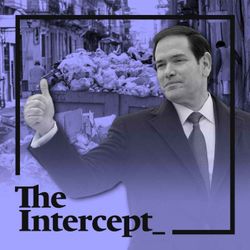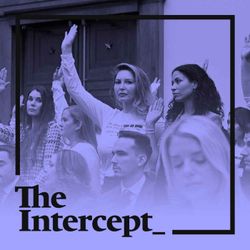Latest episode

9. Rambling Man: Trump’s State of the Union
37:54||Season 3, Ep. 9“The deliberate cruelty that they found humor in stood out to me,” says Jordan Uhl of Donald Trump’s Tuesday evening State of the Union. This week on the Intercept Briefing, co-hosts Uhl, Akela Lacy, and Jessica Washington disentangle Trump’s nearly two-hour-long speech so you don’t have to. “This is who these people are. In some ways, they're trying to sugarcoat what they're doing, but in other ways they're so blatant about doing really evil things around the world and being totally OK with it,” says Lacy, in reference to Trump talking about kidnapping Venezuelan President Nicolás Maduro. “It is really alarming to me how good they are at framing that in a positive light. And there were people cheering all over the room for us toppling a regime, doing regime change, while they're telling you that we don't do that anymore.” Washington adds, “The whole thing, if you read it, if you listen to it, it reads like a white nationalist speech.”The co-hosts also dissect the Democratic Party's official response to the State of the Union, delivered by Virginia Gov. Abigail Spanberger.Listen to the full conversation of The Intercept Briefing on Apple Podcasts, Spotify, or wherever you listen. Keep our investigations free and fearless at theintercept.com/join.
More episodes
View all episodes

8. What Does the Trump Administration Want With Cuba?
58:56||Season 3, Ep. 8Cuba is spiraling into a humanitarian crisis. The country’s long-standing economic and political turmoil reached new heights this week as the effects of the Trump administration’s oil blockade took hold.The president’s targeting of Cuba is part of the administration’s broader attacks on the region, where the U.S. kidnapped Venezuelan President Nicolás Maduro and his wife Cilia Flores earlier this year and has executed more than 140 people in boat strikes.As the U.S. hurtles toward war with Iran and further military action in the Middle East and continues to fund Israel’s genocide in Gaza, Cuba is just the latest foreign policy arena where the Trump administration has further ensnared the U.S. This week on The Intercept Briefing, senior politics reporter Akela Lacy speaks with fellow reporter Jonah Valdez about how U.S. foreign policy is impacting the upcoming midterm elections and Valdez’s recent reporting on how a new anti-Zionist PAC has associated with influencers that have made statements that are outright antisemitic. Lacy also speaks to University of Miami history professor Michael Bustamante and Andrés Pertierra, a historian of Cuba specializing in post-1959 regime durability, about the crisis unfolding in Cuba.Missing from mainstream news coverage of Trump’s attacks on Cuba and U.S. efforts to impose regime change in the region is a recognition of how Trump’s policies fit into his attacks on immigrants in the U.S., Bustamante says.“One of the, I think, subtext of why this administration might be keen on government change in Cuba, like in Venezuela, it's not just about being able to plant the flag and say, ‘We buried communism in the Americas. Something that no other president could do,’” Bustamante says. “It's also about, we can deport more people. And we can deport more people. And so how does the Cuban American community react to that? That, I think, is an open question. Something that I haven't seen linked yet to the conversation about regime change, per se.”The Trump administration’s strategy is likely to backfire, Pertierra says.“You don't get long-term cooperation stability through fear,” he says. “So I don't think it's actually going to solidify the U.S. position in Latin America. I think it's going to further weaken it.”Listen to the full conversation of The Intercept Briefing on Apple Podcasts, Spotify, or wherever you listen. Keep our investigations free and fearless at theintercept.com/join.
The Intercept Briefing Trailer
00:58|Cut through the noise with The Intercept’s reporters as they tackle the most urgent issues of the moment. The Briefing is a weekly podcast delivering incisive political analysis and deep investigative reporting, hosted by The Intercept’s journalists and contributors including Jessica Washington, Akela Lacy, and Jordan Uhl.
7. Attorney for Epstein Survivors Warns That Justice Is Impossible With Bondi as AG
34:18||Season 3, Ep. 7Attorney General Pam Bondi testified before the House Oversight Committee on Wednesday, defending the Justice Department’s widely criticized rollout of the Epstein files against accusations that her department is shielding powerful men, including President Donald Trump, at the expense of survivors. Democrats, who reviewed the unredacted files for the first time this week, revealed that the names of “wealthy, powerful men” were improperly redacted, while the names of victims were left exposed. This week on The Intercept Briefing, co-hosts Jessica Washington and Akela Lacy gave their rundown of the politics stories they’re watching right now. Washington also spoke with Spencer Kuvin, an attorney representing nine of Epstein’s victims, about the failures of the Department of Justice to protect survivors. “From the beginning of this case, the government, both from a state and federal level, have been trying to bury this, cover it up, and avoid any full exposure of the extent of the operation that was involved here,” Kuvin said, “and they're doing it … because of all the both political, wealthy, and powerful individuals who were involved with Epstein and knew what was going on with these young women.” Kuvin also spoke about the DOJ’s failure to redact the names of victims in the files, including two of his clients who were victimized as children. “The current Department of Justice has a focus on something different than victims and helping victims and prosecuting bad people that victimize these young girls,” he said. “Their focus instead appears to be on the important people — powerful people that are contained within these files and protecting them instead of protecting who needs the protection, the young victims in this case.”Listen to the full conversation of The Intercept Briefing on Apple Podcasts, Spotify, or wherever you listen.
6. “Terrorist”: How ICE Weaponized 9/11’s Scarlet Letter
38:50||Season 3, Ep. 6The word “terrorist” wasn’t coined on September 11, 2001, but the defining event of the early 21st century ushered it in as the United States’ go-to term for demonizing outsiders and dissenters alike. The so-called “war on terror” transformed the way the U.S. wields power at home and abroad, enabling mass surveillance and a crackdown on the right to free speech. It became reflexive for the U.S. to disparage immigrants and protesters as supporters of terrorism.President Donald Trump has embraced this model and manipulated it for his own ends, as author Spencer Ackerman points out. The Trump administration often peddles spurious accusations of terrorism against the targets of its immigration raids.“There's nothing about any of their action that's remotely anything at all like terrorism,” Ackerman says. “But that is the fire in which ICE, CBP, and the Department of Homeland Security was forged. You are going to find this in its DNA.”This week on the Intercept Briefing, host Jordan Uhl speaks with Ackerman, a leading expert on the concept of terrorism and its weaponization by the state. Ackerman’s 2021 book, “Reign of Terror, How the 9/11 Era Destabilized America and Produced Trump,” traces the legal and cultural evolution of the last 25 years, and how the boomerang has come back home.“Before 9/11, not only was there no ICE, there wasn't really much in the way of a robust internal mechanism for finding and deporting people who were in the country illegally. When it did exist, it was for people who were serious criminals, traffickers, and so on,” says Ackerman. Now, he says, the contemporary terrorism paradigm has transformed immigration enforcement into something “operating like a death squad.”“What we are seeing on the streets of Minneapolis is what ICE has done to the undocumented for a very long time,” he says. “And now we're seeing this happen to white people on the streets of Minneapolis for little more than filming ICE.” With the recent killings of Renee Good and Alex Pretti, “I worry that a tremendous amount of our political system is geared toward either, on the Republican side, rationalizing it, justifying it, or on the Democratic side, pretending as if this is some kind of abuse that can be exceptionalized, rather than something that has to do with this 25-year history of coalescing immigration enforcement in the context of counterterrorism.”As Democrats in Congress struggle to leverage DHS funding for changes to ICE policy — like a ban on face masks for ICE agents, an idea on which they’ve already softened — Ackerman says the parallels with the early 2000s are clear.“We can't move in reformist directions when the thing talked about being reformed laughs at killing Americans,” advises Ackerman. “Reformist politics under two Democratic administrations got us to where we are now. These are accommodationist politics, and the thing being accommodated wants to kill you.”Listen to the full conversation of The Intercept Briefing on Apple Podcasts, Spotify, or wherever you listen. If you want to support our work, you can go to theintercept.com/join.
5. Even the Top Prosecutor in Minneapolis Doesn’t Know the Identity of the Agents Who Killed Alex Pretti
52:44||Season 3, Ep. 5In the two months Minnesota has been under siege by federal agents, immigration officers have shot and killed two U.S. citizens, poet and artist Renee Good and ICU nurse Alex Pretti. Local and state law enforcement say they’ve been blocked from properly investigating the shootings of Good and Pretti. “The federal government has blocked our state BCA, so that's the Bureau of Criminal Apprehension. They are the state law enforcement agency that has authority to investigate any kind of deadly use of force involving police,” says Hennepin County Attorney Mary Moriarty, who is leading local investigations into the killings of Good and Pretti. “We've not gotten anything from the federal government,” Moriarty says. “To tell you how odd this situation is, we are getting our information from the media ... we are not getting that from the federal government.” This week on The Intercept Briefing, host Akela Lacy speaks with Moriarty, whose office has jurisdiction over both killings. Moriarty says federal agents have blocked local and state law enforcement from properly investigating the killings. Even Moriarty, the top prosecutor in Minneapolis, does not know the identity of the agents who killed Pretti. In response, Moriarty says, “We set up a portal and asked the community to send any kind of videos or any other kind of evidence so that we could collect absolutely everything that we possibly could.” The BCA, she says, was even “blocked physically, actually, by federal agents from processing the scene where Alex Pretti was shot.”Meanwhile, attacks by the administration on Minnesota’s Somali citizens persist. At her first town hall of the year in Minneapolis, an attendee sprayed Rep. Ilhan Omar with an unidentified substance on Tuesday. Trump has backtracked on some of his bluster and removed Border Patrol Gregory Bovino from Minnesota, replacing him with border czar Tom Homan. None of that has changed things on the ground yet in Minneapolis, says Moriarty. “Minnesotans care about their neighbors. They're delivering meals to people. They are there and they do not approve of the fact that their federal government is attacking them and their neighbors.“We hear a lot of people talking to us about how they understand the threat from the administration or from DHS on their neighbors and on their communities, and it's really much more rooted in an understanding that they think their freedoms are under threat, even if they are not an immigrant or even if they don't really have deep ties to immigrant communities, that this really matters to them and it really bothers them,” says Jill Garvey, co-director of States at the Core, an organization that leads and runs ICE Watch training programs. “So we hear a lot from folks who just haven't been engaged previously. But this for all those reasons is enough for them to step up.”Garvey says her organization is training community members in how to properly document ICE. “We also know that we can't stop all this aggression,” Garvey says. “The aggression is the point of these operations. So we can't guarantee that people aren't going to be targeted with violent actions from federal law enforcement. What we can say is, if you're doing this in community, other people are going to be watching.”Listen to the full conversation of The Intercept Briefing on Apple Podcasts, Spotify, or wherever you listen. If you want to support our work, you can go to theintercept.com/join.
4. Protests and Power Plays: From Tehran to the Arctic Circle
49:20||Season 3, Ep. 4The people of Iran are in the midst of one of the country’s biggest uprisings — and harshest government crackdowns — since the Iranian Revolution. It started with shopkeepers in bazaars closing their doors at the end of December in protest of the plummeting Iranian rial and economic distress. But demonstrations soon spread to universities and across the country to every single province. Working-class Iranians wanted relief — both from the inflation crisis and U.S sanctions.This week on The Intercept Briefing, host Akela Lacy speaks with Hooman Majd, an Iranian American writer and journalist, who explains what sparked the protests and the government’s brutal response. “I don't think in the history of Iran, even during the Islamic Revolution, have we seen this number of fatalities.” says Majd. “The death toll is staggering. Really, because that death toll is staggering, what's happened is there are no more protests. And that's where we are right now. No more protest, heavy security on the streets. Massive security on the streets, on every corner. It isn't martial law. But it feels like martial law to people living there.”The path forward is unclear, Majd says. But a few things are certain. “The idea is no to shah, no to an ayatollah, no to theocracy. Let's just, finally, after 120 years of demonstrating — which is what the Iranians have been doing since 1906 — after 120 years of looking for democracy, can we just do that? Can we just get a democracy? That is probably the biggest sentiment in Iran: wanting a democratic rule, wanting the repression to end, wanting better relations with the rest of the world so these sanctions can be lifted.”Some people inside and outside Iran have called on President Donald Trump to intervene. The idea that the U.S. should — or could — impose regime change militarily is folly, Majd says. “Sure, we were able to impose a regime change in Iraq militarily. They can do that again in Iran, possibly with the help of Israel or even without the help of Israel. But then what do you have? Do you have another basically authoritarian, autocratic government?’” Meanwhile, Trump has threatened to intervene in another international arena. He has set his sights on taking over Greenland. Despite walking back his statements pledging to do so by force, Trump has now said he’s forming a plan with the secretary general of NATO for Greenland’s future. We’re joined by independent investigative journalist Lois Parshley, who explains the financial interests behind Trump’s obsession with the Arctic island, the billionaires and tech moguls plotting to exploit Greenland’s natural resources, and how the people of Greenland have responded to the president’s pledge to violate their sovereignty.Shortly before Trump first expressed an interest in Greenland during his first term, his ambassador to Denmark and Greenland visited a major rare earth mining project on the island, Parshley reported last year. “More recently, The Guardian reported that it was Ronald Lauder, heir to the global cosmetics brand [Estée Lauder] who was also a longtime friend of Trump's, who first suggested buying Greenland. He has acquired commercial holdings there and is also part of a consortium who want to access Ukrainian minerals.”Fresh off the invasion of Venezuela, the idea that Trump wants to take over Greenland is even more alarming, Parshley says. “I'm not the first person to report on these kinds of major tech interests in things like crypto states or special economic zones. People have been pointing this stuff out for a long time, but it's not until President Trump started saying the quiet part out loud that people have really been registering some of these absurd concepts that seem to now be creeping toward reality.”Listen to the full conversation of The Intercept Briefing on Apple Podcasts, Spotify, or wherever you listen. If you want to support our work, you can go to theintercept.com/join.
